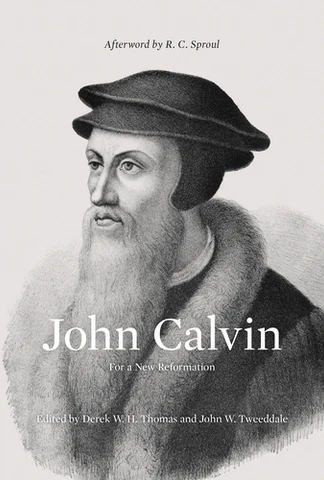
Derek W. H. Thomas and John W. Tweeddale, Eds.
Reviewed by: Brian De Jong
John Calvin: For a New Reformation, edited by Derek W. H. Thomas and John W. Tweeddale. Crossway, 2019. Hardcover, 608 pages, $34.11 (Amazon). Reviewed by OP pastor Brian De Jong.
In the opening chapter of the Westminster Confession, we read these wise words: “All things in Scripture are not alike plain in themselves, nor alike clear unto all.” The divines recognized that some parts of Scripture are, by their very nature, clearer than other parts. Even Peter admitted that certain things in Paul’s writings were difficult to understand. The divines also realized that not every reader understands everything equally well. Some things that are crystal clear to one may be opaque to another person who reads the same passage.
What is true of Scripture is also accurate concerning a wonderful volume of essays entitled John Calvin: For a New Reformation, a work that was in process for years. The late Dr. R. C. Sproul contributed an afterword prior to his death in 2017.
The list of contributors reads like a “Who’s Who” of Reformed scholarship. It includes prominent theologians, like Douglas Kelly, respected church historians, like W. Robert Godfrey, gifted preachers, such as Steve Lawson and Joel Beeke, as well as notable academics, like Paul Helm and Cornelis Venema.
The book divides into two sections. Part 1 focuses on the life and work of John Calvin. This section includes biographical and historical information. For history lovers, these chapters will prove downright delicious. For instance, Godfrey’s contribution on “Calvin and Friends” turns up new ground on numerous relationships in Calvin’s life.
Part 2 pivots to the teaching of John Calvin. Chapters in this section examine Scripture, creation, providence, law, Christ, the Holy Spirit, the Christian life, adversity, predestination, the church, sacraments, the preservation of the saints, and the last things. This part of the book will stimulate positive theological reflection on Calvin’s broad interests. The authors carefully draw out systematic theology analysis from Calvin’s Institutes and Commentaries.
Courageous readers who tackle this lengthy volume will find that all pages are not “alike plain in themselves.” Some chapters are more scholarly in nature and will challenge the interest of a layman. Other chapters will prove more accessible to the casual Christian reader but could be too basic for the veteran Calvin scholar.
Likewise, not every reader will enjoy equal clarity. A new believer who understands little about the Reformation could easily drown in these pools. The authors presuppose a certain understanding of Calvinism, making this book a true delight to those already committed to Reformed thought and practice.
There is a temptation that faces historians and theologians alike. It is the tendency to summarize, recap, and repeat what previous authors have already said. While such an approach is considered safe, it does not contribute any new light to the topic under consideration. Thankfully, these contributors resisted that temptation. They provide fresh insights and new perspectives on the life, work, and thought of “The Theologian,” as Philip Melanchthon called Calvin.
February 01, 2026
January 25, 2026
January 18, 2026
January 11, 2026
Texts that Transform: Church and Ministry
January 04, 2026
December 28, 2025
December 21, 2025
© 2026 The Orthodox Presbyterian Church